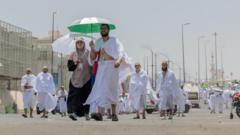As the Hajj pilgrimage kicks off in Mecca with more than 1.4 million participants, Saudi Arabia is implementing stringent measures to protect worshippers from the extreme heat that claimed 1,300 lives last year. This year's temperature is projected to soar to 44C (111F), raising concerns for those making the holy journey.
In response to last year's fatalities—predominantly affecting unregistered pilgrims lacking access to essential facilities—Saudi officials have enhanced safety protocols. Measures include the planting of thousands of trees, installation of over 400 cooling units, and an expanded shaded area of 50,000 square meters (about 12 acres) at key pilgrimage sites.
To ensure the safety of participants, the Saudi government has enforced regulations including a ban on children under the age of 12 from the pilgrimage. Moreover, individuals attempting to enter Mecca without the necessary permits face hefty fines of $5,000 alongside potential 10-year bans from the country. Since the beginning of the pilgrimage, officials have turned away over 269,000 individuals attempting entry without proper documentation.
Many pilgrims, unable to afford the steep cost of official Hajj packages that can range from $4,000 to $20,000 depending on numerous factors, typically enter Saudi Arabia on tourist or visitor visas. This lack of official registration often results in diminished access to essential air-conditioned accommodations, transport, and amenities.
During this initial stage of Hajj, male pilgrims don the traditional two white garments of Ihram, while women wear modest attire that covers their heads. They then proceed to the Grand Mosque, the holiest site in Islam, to perform the tawaf, which involves circling the Kaaba, and the sai, where they walk between the hills of Safa and Marwa.
In addition to shaded areas and cooling systems, authorities are utilizing artificial intelligence to monitor drones managing crowd control. Past incidents, including a devastating 2015 stampede that killed over 2,300 individuals, underscore the critical need for ongoing safety enhancements.
With the international spotlight on this significant spiritual event, the Saudi health ministry is urging pilgrims to adhere strictly to health guidance, including avoiding sun exposure during peak hours and staying hydrated to mitigate heat-related risks.
















